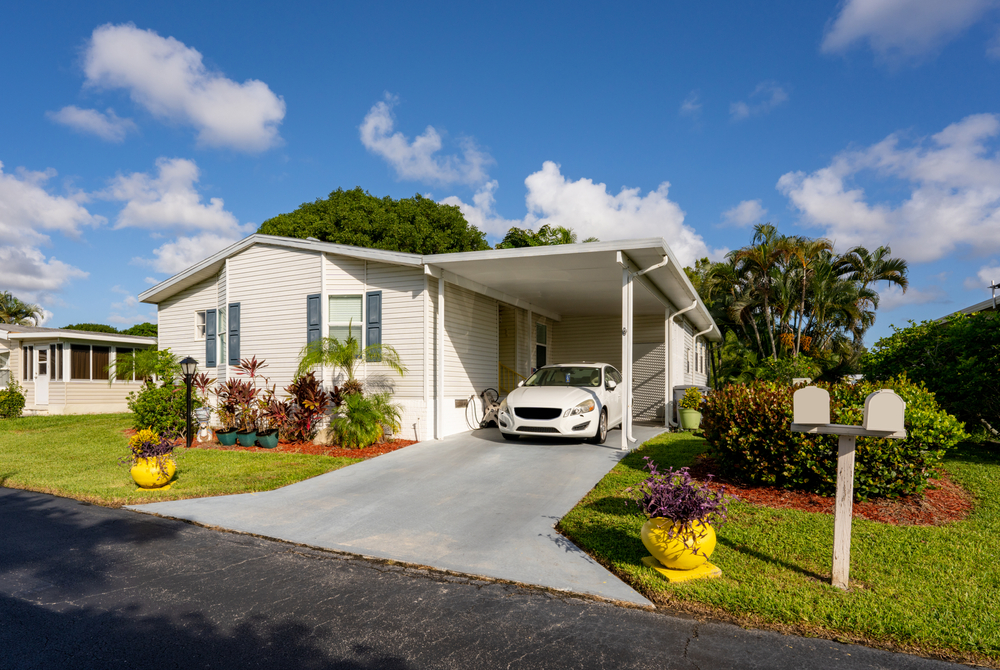
When considering affordable housing options in the Sunshine State, many buyers come across two popular choices: manufactured and modular homes. While they might look similar at a glance, the differences between manufactured and modular homes are significant. Understanding these distinctions is crucial for Florida homebuyers, as the state’s weather, zoning laws, and real estate market trends create unique considerations for each housing type. This blog explores the difference between manufactured and modular homes in Florida, guiding you through their definitions, construction processes, regulations, and ideal applications in the Florida housing market.
Understanding Manufactured and Modular Homes
The terms “manufactured homes” and “modular homes” are often used interchangeably, but they refer to two distinct types of prefabricated housing. A manufactured home, previously known as a mobile home, is built entirely in a factory and then transported to its final location. These homes are constructed according to the federal HUD Code (administered by the U.S. Department of Housing and Urban Development), which was implemented in 1976. Once delivered to the site, they are placed on a permanent chassis, which remains part of the structure.
In contrast, modular homes are also factory-built but follow local, state, and regional building codes — the same codes that govern site-built homes. They are constructed in sections or modules, which are then transported to the site and assembled on a permanent foundation, similar to traditional houses. As such, they are often indistinguishable from site-built homes once completed.
Both types of homes offer streamlined construction timelines and potential cost savings compared to conventional homes, but the difference between manufactured and modular homes goes deeper into regulations, customization, value retention, and financing.
Construction Standards and Design Flexibility
One of the most critical distinctions between manufactured vs modular homes in Florida is the construction standard. Manufactured homes, built under the federal HUD Code, have a uniform standard across the country. The HUD Code regulates aspects such as design, durability, energy efficiency, and transportability. However, these homes are more limited in terms of structural flexibility and customization. Because of their chassis-based design and mobility requirement, manufactured homes are generally more rectangular and simpler in layout.
Modular homes, on the other hand, are built to the Florida Building Code or other applicable local standards. This allows for greater flexibility in architectural design, enabling more complex layouts, multi-story structures, and even the ability to incorporate garages, porches, or high-end finishes. Modular homes can be tailored to a homeowner’s specific desires and often resemble traditional homes in every way.
In Florida’s diverse climate zones — from hurricane-prone coastal areas to more inland terrains — these building code differences matter. Modular homes often offer better resilience to weather conditions because they adhere to stricter local safety regulations, such as wind resistance requirements. Some modular homes in Florida are even designed to meet Miami-Dade County’s stringent hurricane codes.
Installation, Zoning, and Land Use
Zoning regulations play a significant role in the difference between manufactured and modular homes in Florida. Manufactured homes are often restricted to designated mobile home parks or zoned areas where these dwellings are allowed. Many municipalities in Florida limit the placement of manufactured homes on private lots, particularly in urban or high-density areas. In some cases, manufactured homes may also face stigma or lower acceptance among potential neighbors or homeowner associations.
Conversely, modular homes, due to their compliance with local building codes, are generally permitted in any area where traditional site-built homes are allowed. This makes them a more versatile choice for homeowners looking to live in a broader range of Florida neighborhoods. In essence, a modular home can be placed in suburban developments, rural lots, and even some coastal zones with fewer zoning hurdles.
Installation processes also differ. Manufactured homes are typically delivered in one or two pieces and placed on a concrete pad, piers, or other HUD-compliant foundations. Modular homes require a more robust installation process, including cranes for placement and site work that resembles conventional homebuilding. This also means that modular homes tend to have a stronger connection to the land and are more likely to be considered permanent dwellings by local jurisdictions.
Financing, Insurance, and Value Over Time
The differences in construction and zoning directly impact how manufactured vs modular homes in Florida are financed and insured. Manufactured homes are often classified as personal property unless permanently affixed to a foundation and titled as real property. This classification can limit financing options to chattel loans, which usually carry higher interest rates and shorter terms than traditional mortgages.
In contrast, modular homes are typically considered real property from the start, making them eligible for conventional mortgage financing. This distinction provides access to better loan terms, FHA or VA financing, and refinancing options — a substantial advantage for Florida buyers seeking long-term homeownership.
Insurance is another critical factor, especially in a state like Florida where homeowners must contend with hurricane risk, flood zones, and rising premiums. Manufactured homes often carry higher insurance premiums and may be more difficult to insure due to their structural limitations and perceived risk. Modular homes, built to local codes, generally qualify for standard homeowner policies, which are more affordable and comprehensive.
When it comes to long-term value, modular homes tend to appreciate similarly to traditional homes, provided they are maintained and located in desirable areas. Manufactured homes, however, may depreciate over time, especially if not titled as real property or if located in mobile home communities. For Florida homeowners concerned with building equity and resale potential, this is a vital distinction.
Which Is Better for Florida Living?
Choosing between manufactured and modular homes in Florida depends on your lifestyle, budget, and long-term plans. Manufactured homes offer affordability and faster move-in times, making them ideal for retirees, seasonal residents, or those on a fixed income. They are especially popular in Florida’s extensive network of 55+ communities and mobile home parks, where residents benefit from shared amenities and lower costs.
However, modular homes present a compelling alternative for buyers seeking higher quality, flexibility, and permanence. They are well-suited for growing families, professionals, or investors interested in Florida real estate appreciation. Modular homes are particularly attractive in areas with stricter zoning rules or where building codes demand hurricane-resistant features.
Additionally, the Florida real estate landscape is evolving. With increased demand for affordable housing and sustainable building practices, both manufactured and modular homes play essential roles. Florida’s Department of Economic Opportunity and various local governments have started promoting modular construction as a solution to housing shortages, especially after storms like Hurricane Ian highlighted the vulnerabilities of older housing stock.
In the end, the choice hinges on your specific circumstances. If you prioritize affordability and speed, manufactured homes are a viable option — but be mindful of zoning restrictions and financing limitations. If you’re looking for long-term investment, better insurance rates, and design customization, modular homes, Florida-style, are worth the consideration.
Looking for A New Custom-Built Home?
We’d love the opportunity to help you find your dream home here in beautiful Southwest Florida. At LeeCorp Homes, our family has been proudly serving families like yours for over 42 years, specializing in high-quality manufactured and custom-built homes. Whether you’re looking for a new home or a replacement, our experienced team at our Estero Model Center or North Port office is ready to guide you every step of the way. Reach out to us today—we’d be honored to help you get started on creating a home that fits your life perfectly.

No comment yet, add your voice below!